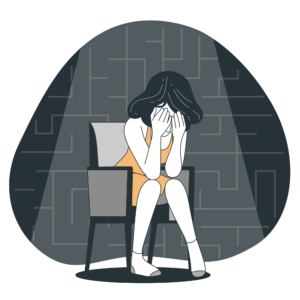Let’s Talk About…
Sleep Deprivation
Let’s Talk About…
Sleep Deprivation

This article was written by:


Remember: it can always get better, the first step is yours!
SAMHA RY is here for you. If you need someone to talk to, to listen, and who can help you get better-contact us today.
If you need help don’t hesitate to contact us right away. We are available Monday-Thursday 10-17.00 for an appointment, reserve an appointment online, or contact us via Whatsapp, Phone call, email, or social media.
REFERENCES
Abdel-Khalek, A. M. (2010). Prevalence rates of reported nightmares in a cross-sectional sample of Kuwaiti children, adolescents, undergraduates, and employees. Sleep Hypn, 12(1-2), 13-22.
Clement-Carbonell, V., Portilla-Tamarit, I., Rubio-Aparicio, M., & Madrid-Valero, J. J. (2021). Sleep quality, mental and physical health: a differential relationship. International journal of environmental research and public health, 18(2), 460.
Curcio, G., Ferrara, M., & De Gennaro, L. (2006). Sleep loss, learning capacity and academic performance. Sleep medicine reviews, 10(5), 323-337.
Friedrich, A., & Schlarb, A. A. (2018). Let’s talk about sleep: a systematic review of psychological interventions to improve sleep in college students. Journal of Sleep Research, 27(1), 4-22.
Ghrouz, A. K., Noohu, M. M., Manzar, M. D., Spence, D. W., BaHammam, A. S., & Pandi-Perumal, S. R. (2019). Physical activity and sleep quality in relation to mental health among college students. Sleep and Breathing, 23(2), 627-634.
Hershner, S., & O’brien, L. M. (2018). The impact of a randomized sleep education intervention for college students. Journal of Clinical Sleep Medicine, 14(3), 337-347.
Lohsoonthorn, Vitool, Hazar Khidir, Gardenia Casillas, Somrat Lertmaharit, Mahlet G. Tadesse, Wipawan C. Pensuksan, Thanapoom Rattananupong, Bizu Gelaye, and Michelle A. Williams. “Sleep quality and sleep patterns in relation to consumption of energy drinks, caffeinated beverages, and other stimulants among Thai college students.” Sleep and Breathing 17, no. 3 (2013): 1017-1028.
Lund, H. G., Reider, B. D., Whiting, A. B., & Prichard, J. R. (2010). Sleep patterns and predictors of disturbed sleep in a large population of college students. Journal of adolescent health, 46(2), 124-132.
Navarro-Martínez, R., Chover-Sierra, E., Colomer-Pérez, N., Vlachou, E., Andriuseviciene, V., & Cauli, O. (2020). Sleep quality and its association with substance abuse among university students. Clinical neurology and neurosurgery, 188, 105591.
Owens, Judith, Rhoda Au, Mary Carskadon, Richard Millman, Amy Wolfson, Paula K. Braverman, William P. Adelman et al. “Insufficient sleep in adolescents and young adults: an update on causes and consequences.” Pediatrics 134, no. 3 (2014): e921-e932.
Vail-Smith, K., Felts, W. M., & Becker, C. (2009). Relationship between sleep quality and health risk behaviors in undergraduate college students. College Student Journal, 43(3), 924-930.
Schlarb, A. A., Kulessa, D., & Gulewitsch, M. D. (2012). Sleep characteristics, sleep problems, and associations of self-efficacy among German university students. Nature and science of sleep, 4, 1.










